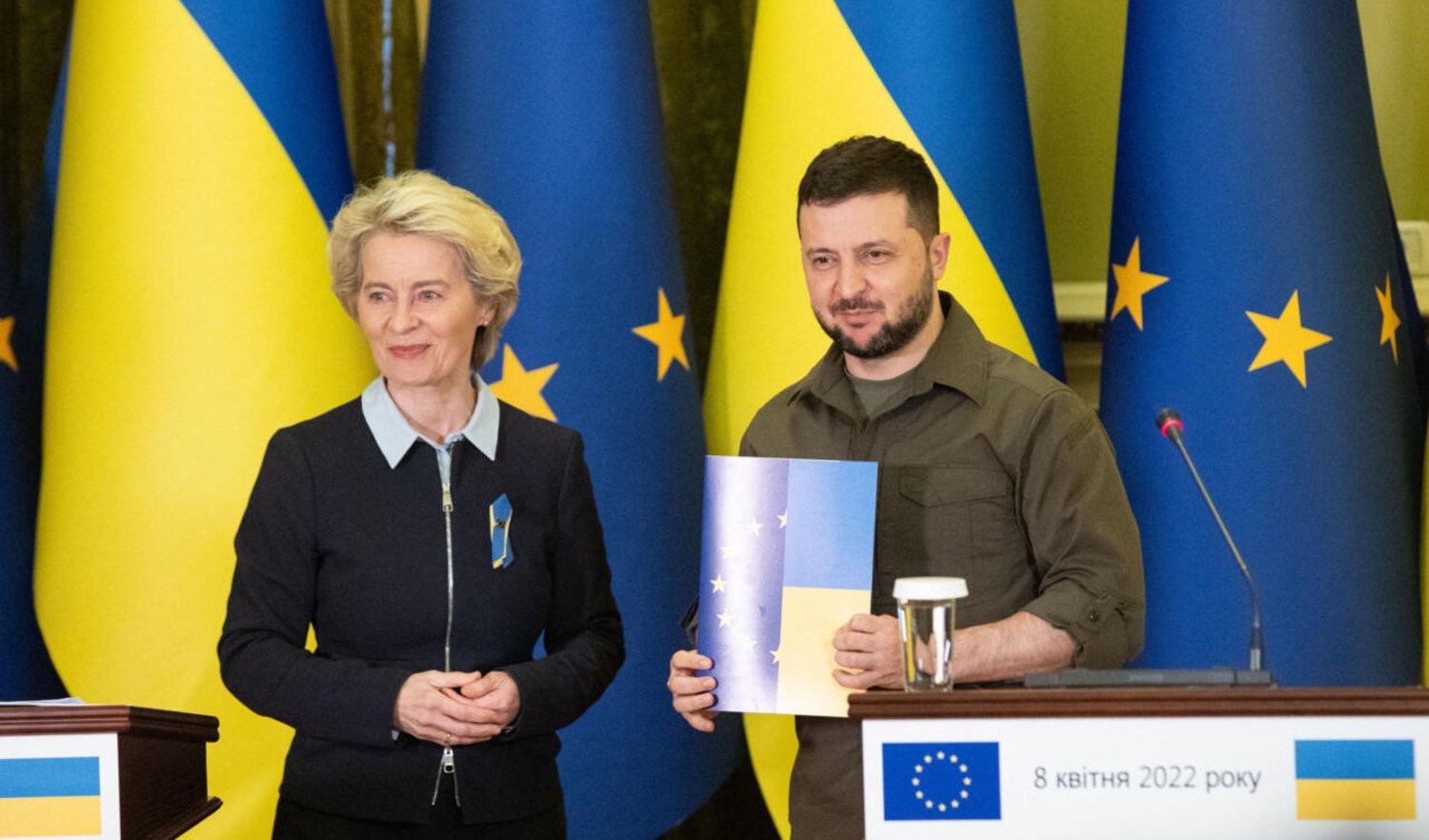Europe thinking twice about Ukraine aid ahead of regional elections
As Poland and Slovakia face elections within the next month, support for Ukraine has been waning on a frightening level for Ukraine, which has been nagging for arms amid its counteroffensive.
-

In this photo taken on April 8, 2022, European Commission President Ursula von der Leyen and Ukrainian President Volodymyr Zelensky are seen at a joint press conference in Ukraine. (AFP)
The nations of Poland, Slovakia, and others located in Central and Eastern Europe, who have been fierce advocates of Ukraine in the conflict, are now facing re-election challenges and other domestic matters - making support for Ukraine fade away little by little.
The most recent and shocking instance is Poland, after its Prime Minister Mateusz Morawiecki announced on Wednesday that the new weapon deliveries to Ukraine are stopping, possibly escalating the already-escalated dispute between both nations regarding grain shipments, which Poland claims is undercutting local production from Polish farmers.
In an appearance on the Polish television channel Polsat, Morawiecki said: “We are no longer transferring weapons to Ukraine, because we are now arming Poland with more modern weapons.”
Ivan Krastev, chair of the Center for Liberal Strategies in Sofia, Bulgaria, stated, “Ukraine realizes that in the last months, they’re not bordering Poland, they’re bordering Polish elections,” adding that “the votes of a hundred thousand Polish farmers are more important for the government than what is going to be the cost for Ukraine. And we’re going to see this happening in many places.”
🇺🇦🇵🇱 “Ukraine is like a drowning man who will drag down those who are trying to help him.”
— Lord Bebo (@MyLordBebo) September 20, 2023
— Andrzej Duda, Polish President pic.twitter.com/SV4IJxGNbO
Morawiecki is up for a tough battle on October 15 against former Prime Minister Donald Tusk, who was once the president of the European Council. Tusk is appealing to supporters of the far-right Confederation Party, which opposes Ukrainian aid.
'Showing true colors'
According to Politico, citing an anonymous Western diplomat who asked not to be identified, the grain farming disagreement between Ukraine and Poland is bringing to the surface issues that may arise if Ukraine joins the EU.
“For 18 months, Poland has badgered any member state that would utter the slightest hesitation towards Ukraine,” the diplomat said, adding, “Now they’re showing their true colors.”
Poland, however, won't be the only problem Ukraine is facing, but no nation has been as vocal as Estonia’s liberal prime minister, Kaja Kallas.
Kallas, the daughter of a former prime minister and European commissioner, became the symbol of a new Eastern Europe that would take the Ukraine crisis for positions of greater power in Belgium, but her credibility was just shortlived following a scandal involving her husband. Her husband was found to own a stake in a firm doing business in Russia following the start of the war in February 2022, and even after his wife kept calling to end all trade with Russia.
Read next: French politician demands no more weapons shipments to Kiev
Regarding that matter, Estonia’s Foreign Minister Margus Tsahkna claimed that there is not an amount of political disruption that would change the country’s path: “We constantly have elections, and we constantly have domestic issues, but it doesn’t change our policy,” he said, adding: “One thing Estonia has had in all these 32 years is the same continuous foreign policy.”
But since her husband's scandal became public, Kallas has been a lot less vocal since August, and thus vocal support for Ukraine became more silent.
If Slovakia's Fico wins, Ukraine loses
In comes Slovakia, which has been a big supporter of Ukraine, but as elections are due at the end of this month, tables could turn.
Milan Nič, a fellow at the German Council on Foreign Relations, said, “If you have a society where only 40 percent support arms delivery to Ukraine and your government offers support almost at the level of the Baltics, that creates a backlash”.
Slovakia's populist former prime minister, Robert Fico, is currently basing his campaign on a pro-Russian, anti-American rhetoric that voices opposition sanctions against Russian individuals and arms deliveries to Ukraine. According to POLITICO’s Poll of Polls, Fico is on track to win the elections on September 30.
Fico's win could give more leverage to Hungarian Prime Minister Viktor Orbán, who has been vocal about opposing aid to Ukraine, on the EU stage. Fico told AP this month that if his party does win, “we won’t send any arms or ammunition to Ukraine anymore.”
However, nations like Lithuania, Latvia, Romania, Sweden, and Finland are claiming to be strongly committed to supporting Ukraine. Meanwhile, some critics and analysts argue that Poland and Slovakia’s role in not delivering any arms indicates no importance since there isn't much weapon stock left to deliver in their armories.
Last Friday, Ukraine’s Deputy Prime Minister for European Integration Olha Stefanishyna downplayed the tension between Ukraine and Europe, saying, “We have a strong commitment and a political confirmation that none of the political processes will affect the ongoing support.”

 5 Min Read
5 Min Read








